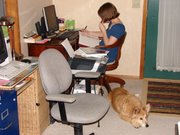Katie Meyers
Online Lab Six – How Do Your Muscles Work?
Muscle Action
Here is an image of me testing the muscle hardness of my jaw when I grit my teeth.

This shows me measuring the length of my biceps during contraction and relaxation.

Lastly, this image shows me measuring the circumference of my upper arm and comparing the difference between the relaxed muscle circumference and the contracted muscle circumference.

Effect of Temperature on Muscle Action
This is an image of me making fists (over 20 seconds) before and after submerging my hand in ice water.

This is me soaking my hand in a bowl of ice water for one minute.

Here is a table of my results concerning the effects of temperature on muscle action.

Effect of Fatigue on Muscle Action
Here is an image of me squeezing a tennis ball.

Here is a table of my results concerning the effects of fatigue on muscle action.

Analysis of Data
1) What are the three changes you observed in a muscle while it is working (contracted)?
The three changes I noticed during muscle contraction were: my muscles got harder or firmer, they shortened, and they bulged or stuck out more than when they were relaxed.
2) What effect did the cold temperature have on the action of your hand muscles? Explain.
The cold temperature inhibited my muscle action, as is evidenced by my numbers (Figure 1). This happened because the cold inhibits molecular movement and chemical reactions, thereby making the muscle act more slowly. However, I was surprised there was not more of a difference between the two numbers. The difference that was there though did support the concept that cold temperature inhibits muscle action.
3) What effect did fatigue have on the action of your hand muscles? Explain.
By my seventh repetition, fatigue was evidenced by my drop in repetitions over twenty seconds. Therefore, fatigue inhibited my muscle action. This was because fatigue is when muscles relax, despite that stimulation (for muscular contraction) of those muscles continues.
Conclusion Concerning Cold and Fatigue
Why, at the cellular level, did cold and fatigue affect my muscular action? When it comes to cold, I think it was because the cold slowed down the chemical actions and reactions required for muscular contraction (e.g. sarcoplasmic reticulum’s release of calcium to stimulate actin and myosin and therefore muscle action). As for fatigue, it results from a buildup of lactic acid in muscle cells/tissue and depletion of glycogen/glucose. At the cellular level, this explains why my muscles began relaxing, despite the continued action potential messages being sent to those muscles telling them to contract.

1 comment:
Katie, this is stellar work—at really a professional level. I think we ought to publish your limb model and your compendiums are incredibly complete. The online labs are also beautifully presented and I really enjoyed your essay. Keep it up—just one unit left!
LF
Post a Comment